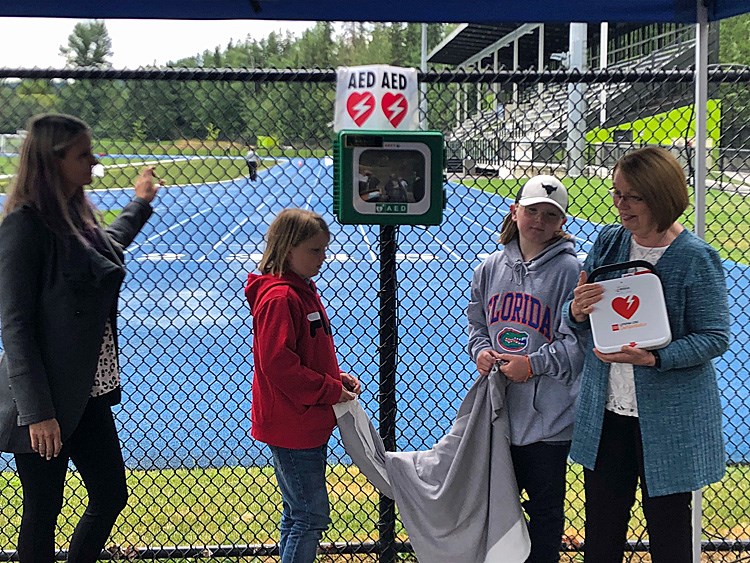Shirley Bond knows an automated external defibrillator (AED) can save the life of a heart attack victim.
Without that device, the chance of surviving a sudden cardiac arrest drops to less than 10 per cent.
Because they are so easy to use and so critical in reviving a patients, Bond is continuing on her mission to make an AEDs mandatory in all public buildings in B.C.
The Prince George-Valemount MLA first tabled her proposal in 2019 and reintroduced it to the Legislature as a private member’s bill last May, but so far there has been no signs the government will act upon it.
While most provincial politicians agree it’s a good idea, Bond said the cost of each machine, between $2000 and $2,400, is most likely what’s preventing the bill from becoming a law.
“The argument I make is, what’s the cost of saving a life?” said Bond. “Making sure they’re in public places where people gather, ultimately you hope they never have to be used , but if they’re there and it happens, we’re pretty thankful they are there.
“We continue to hear from people who want to have an AED in a public space. I would hope that at some point the government will recognize the importance of broader availability of AEDs.”
A cardiac arrest in which the heart stops beating is usually related to a disruption in the electrical activity of the heart, which causes it to beat too fast or with an irregular pattern. That can keep the heart from pumping blood effectively and can cause it to stop. When breathing is interrupted, without an intervention the brain and other vital organs won’t get the blood and oxygen they need and death can occur in minutes.
A bystander who provides chest compressions and breathes into the mouth of the victim using cardiopulmonary resuscitation (CPR) can keep the person alive, but in most cases an AED is needed to provide an electric jolt that gets the heart beating at a normal rhythm again.
In memory of her husband Bill, who died nearly two years ago of a stroke, after having had open-heart surgery, Bond worked the Heart and Stroke Foundation and the Prince George Community Foundation to start the Bill Bond Memorial Fund, which as so far paid for eight AED machines.
“The thing that Bill and I found really compelling is there’s a very low survival rate if you have a cardiac arrest outside of a hospital unless you have CPR and access to an AED, so having them available in public places really does save lives,” said Bond.
The PulsePoint AED app tracks the location of each AED machine registered with B.C. Emergency Health Services and provides users with that localized information wherever they might travel in the province. Not all the AEDs in the city show up on the PulsePoint map and Bond emphasize that’s why it’s important to register each machine with BCEHS and keep each machine well maintained.
“I don’t know where the city has theirs, AEDs can’t help us if we don’t know where they are,’ said Bond. “The PulsePoint app shows that many businesses have them. What’s really critical is that people maintain and register them because that way people know where they are.”
Following the lead of the Western Hockey League, the B.C. Hockey League made it mandatory in 2020 for each of its teams to have an AED at all team events. Several large stores in the city, including Save-On Foods, Home Depot and London Drugs and Pine Centre Mall, have heart defibrillators, as do the Outdoor Ice Oval, city arenas and some of the private schools.
Bond installed four AEDs in Prince George – Masich Place Stadium, College Heights Senior Centre, Prince George Legion, and Prince George Gymnastics Club. The unit installed at the stadium is located outside and is stored in a temperature-controlled cabinet.
She also placed four AEDs in the Robson Valley - at Mount Robson Provincial Park visitors centre, Valemount IGA grocery store, McBride railway station and Dunster community store - and expects to announce two or three more in the next month.
Money raised by Shawn and Lisa Rice and their Heart and Stroke Big Bike event paid for several defibrillators and private donors have contributed enough for Bond to add several more AEDs early this year. If you would like to contribute to the fund, go to the PG Community Foundation website.



